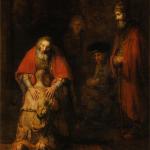
In the medical field, it is impossible to prescribe proper treatment and provide an astute prognosis without a sound diagnosis of a patient’s condition. That is why I always pray that medical professionals tending to my son’s traumatic brain injury and resulting aftermath discern what the causes are for his various ailments. Sound diagnosis of a medical problem makes astute prognosis possible. The same is true in the spiritual domain. Lenten lament aims to help us discern what is wrong with our spiritual condition so that we can address the problem in pursuit of spiritual healing.
Lent is incredibly important to a healthy spiritual diet. Given the predominance of the prosperity gospel culture, it is very difficult for us to discern the importance of addressing our spiritual brokenness, indeed, our “sinful condition” as humans. We must come to terms with the import of Lenten lament. Lent helps us account for the depths of our spiritual isolation and self-absorption and the necessity of relational connections to address the need.
I have always admired Alcoholics Anonymous and the importance they attach to an individual person coming to terms with their alcoholism. That acknowledgment is critically important to obtaining help. So, it is with all of us. We are in great need spiritually. But we cannot address the problem of selfish desire and solitary confinement alone. We need others to help us. “Others” here include the God revealed in Jesus through the power of the Spirit, who is truly our “higher power,” and a community of people to whom we can go and who hold us accountable in pursuit of relational healing. Scripture teaches us to confess our sins to God and to one another to experience cleansing and healing in life:
“If we confess our sins, he is faithful and just and will forgive us our sins and purify us from all unrighteousness.” (1 John 1:9; NIV)
“Therefore, confess your sins to each other and pray for each other so that you may be healed. The prayer of a righteous person is powerful and effective.” (James 5:16; NIV)
Unless we acknowledge our spiritual desperation, indeed destitution, we cannot acquire the necessary medicine and undergo the appropriate surgery to restore and transform us. When we discount the importance of Lent, it is almost as if we go straight from Christmas to Easter, stopping briefly perhaps at Good Friday, without comprehending why a day so bad for Jesus can be so good for us. I wrote the following statement on Lent in my book, Setting the Spiritual Clock: Sacred Time Breaking Through the Secular Eclipse:
The Christian liturgical season of Lent begins on Ash Wednesday and leads up to Easter Sunday. Lent focuses on purification from sin involving selfish desire, while also highlighting the need for death to self in pursuit of vital, life-giving union with Jesus. Lent is counterintuitive to two contrasting types in contemporary culture: first, the prosperity gospel devotee who only values celebration; and second, the nihilist who perceives all life as suffering and all suffering as meaningless.
Regarding the prosperity gospel mind-set, Lent instructs us that there can be no uniquely Christian abundant life that does a detour around fellowship in Christ’s sufferings. As the Apostle Paul exemplifies for us, the godly Christian wants to know Christ, which entails not only knowing experientially the power of Jesus’ resurrection but also knowing the fellowship of sharing in his sufferings and becoming like him in his death in order to attain to the resurrection from the dead (see Phil 3:10).
I resonate with how the Reformed Church understands Lent. The following is taken from The Worship Sourcebook:
Lent invites us to make our hearts ready for remembering Jesus’ passion and celebrating Jesus’ resurrection . . . As a period of preparation, Lent has historically included the instruction of persons for baptism and profession of faith on Easter Sunday; the calling back of those who have become estranged from the church; and efforts by all Christians to deepen their piety, devotion, and readiness to mark the death and resurrection of their Savior. As such, the primary focus of the season is to explore and deepen a “baptismal spirituality” that centers on our union with Christ rather than to function only as an extended meditation on Christ’s suffering and death….
Ultimately, Lent informs us that our painful isolation, whether in narcissistic celebration or nihilism, or some other form, will not address what ails us—our spiritual isolation involving selfish desire. Unlike “Moralistic Therapeutic Deism,” which reduces God to a “divine butler” or “cosmic therapist,” or the rich young ruler described in Matthew 19 who decided to go it alone to desperately try to attain eternal life rather than follow Jesus, we need Jesus and those who embrace union with him to come alongside us. Only as we are united to Jesus and share in his life of suffering unto death and resurrection power will we experience the needed relational transformation.
In closing, let’s return to where I started in this post—the need for a sound diagnosis. A nurse and CNA asked my son Christopher yesterday morning if he was in pain. He blinked to let them know he was. When they asked him if he could indicate where, he slowly raised his right arm to the right side of his head and pointed to the area. Such simple acknowledgment and responsiveness to his condition is a good thing, even though he was in pain. It also helps his caregivers in addressing his needs at various levels. They were able to provide him with some measure of relief.
The same routine occurred this morning, though Christopher raised his arm far more quickly to point to his head. Again, the CNA had asked if he was in pain and if he could point to the location. While my son has a long way to go, and while we will need to inquire about the source of the pain in that sphere of his head, he is increasingly responding to the attentive staff. He won’t experience healing for what ails him without them and others. Nor will any of us for that matter.
To read the various posts on my son and family’s journey with TBI, please go here. Thank you for your prayers!














